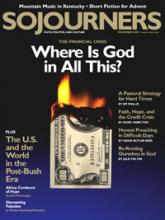Many Americans are angry about this financial crisis, angry about a rescue plan that seems to bail out Wall Street more than them, and frustrated with the lack of clear solutions being offered by politicians. But underneath the anger, there is a deeper level of fear in America right now. I am hearing that fear across the country. How will this affect me and my family? What will happen to my retirement funds, to the college account for my kids, to the value of my home? Am I going to lose my home or even my job? As the immediate crisis turns into a longer and deeper recession, these questions will only increase. A continued rise in unemployment and foreclosures, along with shrinking investments and credit, will bring more pain to ordinary Americans.
Recently on CNN a financial consultant reported that some of her clients are already living in their cars. I could feel the fear gripping many Americans. A friend of mine, a financial planner now engaged in intense daily conversations with his clients, left me a simple voicemail—“Pray for me.”
It’s not often that most Americans are worrying about the same thing at the same time. The last time might have been just after 9/11. But it is increasingly clear that most Americans are focused on the same thing right now. The collapse of Wall Street, the deepening economic recession (the biggest economic crisis since the Great Depression), and the clear threat of another depression have become the overriding foci of public conversation. Every other issue is perceived as a distraction.
For Christians, there are deeper questions that should be asked: What is a Christian response to a deepening economic crisis like this? What should people of faith be thinking, saying, and doing? What is the responsibility of the churches to their own parishioners, to their communities, to the nation, and to the world? And where is God in all this?
Read the Full Article
